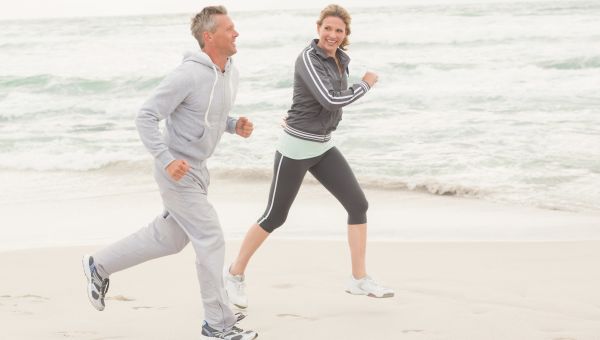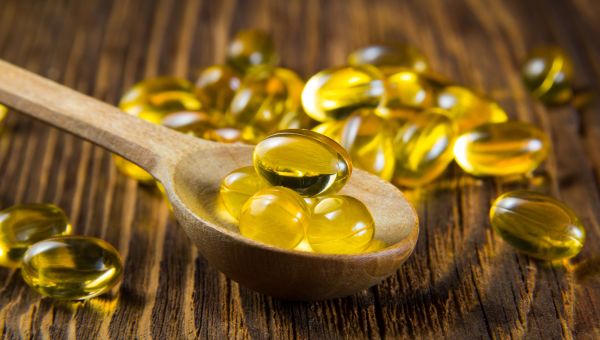How to boost your joint health and lengthen your life
Expert-approved foods, moves, and tips to help you become more flexible.
Updated on September 8, 2024

Joint pain is commonly seen as an unavoidable side effect of aging—and is too often why people skip activities they love. But becoming older doesn’t have to mean aching joints or not being able to exercise.
An active lifestyle, including regular exercise, is one of the best ways to boost joint health. Read on for other healthy habits that can strengthen your joints.

Set small, doable weight-loss goals
Being overweight puts unnecessary pressure on your joints. It also increases your risk of life-threatening illnesses like heart disease, diabetes, and breast cancer.
When you’re trying to lose weight, it can be helpful to set small, achievable goals for yourself.
“Focus on losing five pounds at a time. If you can do that, you’re taking a pretty significant amount of weight off your joints. For every pound you lose, about three to five pounds of pressure is taken off your hips and knees,” explains Sean McMillan, DO, an orthopedic surgeon from Lourdes Medical Center of Burlington County, in Willingboro, NJ.

“Move naturally” and keep moving
Residents of Blue Zones, or places where people reach age 100 at higher rates than anywhere else on earth, share an important habit. They “move naturally,” or exercise often by building movement into their daily routines.
Staying active is one of the best ways to lower your risk of chronic illnesses like heart disease, plus it can both prevent and ease joint pain.
Do you get stiff when you sit still for a long time? That’s because inactivity allows fluid to pool around your joints, causing swelling, stiffness, and discomfort. Once you get moving, the swelling goes down and stiffness decreases.

Try joint-friendly exercises
According to the Physical Activity Guidelines for Americans from the U.S. Department of Health and Human Services, each week all adults should get at least 150 minutes of moderate-intensity aerobic exercise, or 75 minutes of vigorous aerobic exercise. And doing more than the minimum may be even better—health benefits continue to rise with more exercise.
Are you motivated to exercise, but achy joints keep getting in the way? Opt for low or no-impact activities, recommends Dr. McMillan. For example, try water aerobics at your local YMCA. The buoyancy of the water eases the pressure on your joints, while you get an excellent cardio workout. Other low-impact exercises include:
- Walking—“move naturally” by parking further away from the store entrance, or getting off the bus a stop early and walking the extra distance
- Riding a stationary or recumbent bike, set to low resistance
- Using an elliptical machine
If you have joint pain, avoid exercises that involve bending and twisting, or that place “pounding” pressure on your joints like running, the rowing machine, kneeling, lunges, and squats.

Stretch to stay limber and prevent injuries
Stretching can reduce stiffness in the morning, lubricate your joints, and prevent injuries during exercise. In fact, daily stretching may help older adults lower their blood pressure. It can also improve muscle power, which could help older adults stay mobile and live independently for longer periods of time.
Tight muscles can strain or pull your joints in the wrong direction. “But stretching loosens your muscles and helps them to fire appropriately,” explains McMillan.
Aim to stretch for 15 minutes daily. “You want to stretch to a point where you feel mild discomfort, but not pain. You don't want to cause damage or a tear by pushing yourself too much,” McMillan adds. Ease into your stretch and avoid “bouncing” to reach further.

Take standing breaks at work
Good posture can keep you from leaning or twisting in a way that puts unnecessary strain on your joints. It can also boost your energy and productivity, strengthen your core muscles, and ease chronic headaches. To avoid slouching at work:
- Raise your computer so the center of your monitor is at or just below eye level
- Keep your head and neck in line with your torso
- Make sure your back is straight, but relaxed
Another trick: Switch to a standing desk if you start hunching over. Changing positions can get your blood flowing and relieve stiffness. Since sitting all day puts you at risk for chronic illnesses like diabetes, alternating between sitting and standing—and taking walking breaks throughout the day—can help you stay healthy, which may lengthen your life.

Eat more fatty fish
The American Heart Association recommends eating three ounces of cooked fatty fish, like salmon, sardines, or whitefish, twice a week. The omega-3 fatty acids in these fish help to slow the buildup of cholesterol plaque, decrease high blood pressure, and reduce your risk of early death from heart disease.
“Eating salmon also supports healthy joints,” says McMillan. “There are a number of possible mechanisms for this, but omega-3 fatty acids play an important role in reducing inflammation.”
For example, people with rheumatoid arthritis may experience fewer symptoms when taking fish oil supplements, according to a 2022 systematic review published in the journal Nutrients. But opt for fresh fish when possible and always talk to your healthcare provider (HCP) before trying a new supplement.

Snack on fresh cherries
“Eat fresh cherries to curb the inflammation that causes gout and arthritis pain,” recommends McMillan. Eating cherries may reduce your risk of a gout flare, too, according to a 2019 systematic review published in the journal Evidence-Based Complementary and Alternative Medicine.
“Cherries contain anthocyanins,” he explains. Anthocyanins are antioxidants that reduce inflammation and give the fruit its red color. Choose tart cherries like the Montmorency variety to get the most antioxidants.
Sweet cherries may also have benefits, possibly helping to protect you from cancer. A 2021 review published in the journal Molecules found encouraging data about the ability of sweet cherries to limit the spread of cancer cells in early lab studies, although more research is needed to learn if they offer cancer protection in humans as well.

Be careful with supplements
Many supplements are touted as being able to work wonders for people with achy joints. But it’s important to remember that these products don’t always deliver on their promises.
“Joint supplements are not regulated by the U.S. Food and Drug Administration,” warns McMillan. “So not every supplement is the same. Even if you do your research, the product you buy might contain other ingredients or have an incorrect label.” Supplements come with possible side effects, too. For example:
- Glucosamine: “If you have diabetes, glucosamine may actually raise your blood sugar,” explains McMillan.
- Fish oil: “Fish oil is great for joint and heart health, but if you have a bleeding disorder, it can increase your risk of unsafe bleeding,” he adds.
The bottom line: Talk to your HCP before trying any new supplement. Together, you can discuss the potential risks and possible benefits of any product before you try it. If you decide that a supplement may work for you, your HCP can help you determine a safe and effective dose.

Harvard Health Publishing. Why weight matters when it comes to joint pain. December 11, 2019.
Centers for Disease Control and Prevention. How Overweight and Obesity Impacts Your Health. Accessed September 8, 2024.
Ungvari Z, Fazekas-Pongor V, Csiszar A, Kunutsor SK. The multifaceted benefits of walking for healthy aging: from Blue Zones to molecular mechanisms. Geroscience. 2023 Dec;45(6):3211-3239.
Cleveland Clinic. Why You Wake Up With Stiff Joints. June 28, 2023.
Johns Hopkins Arthritis Center. Osteoarthritis: Signs and Symptoms. Page accessed September 8, 2024.
U.S. Department of Health and Human Services. Physical Activity Guidelines for Americans, 2nd Edition. PDF accessed September 8, 2024.
Centers for Disease Control and Prevention. How Do I Exercise Safely With Arthritis? Page last reviewed April 6, 2022.
La Greca S, Rapali M, Ciaprini G, et al. Acute and Chronic Effects of Supervised Flexibility Training in Older Adults: A Comparison of Two Different Conditioning Programs. Int J Environ Res Public Health. 2022 Dec 17;19(24):16974.
Arntz F, Markov A, Behm DG, et al. Chronic Effects of Static Stretching Exercises on Muscle Strength and Power in Healthy Individuals Across the Lifespan: A Systematic Review with Multi-level Meta-analysis. Sports Med. 2023 Mar;53(3):723-745.
Arthritis Foundation. Get in the Habit of Stretching. Page accessed September 9, 2024.
Harvard Health Publishing. The importance of stretching. April 17, 2024.
Laskowski, Edward. “What are the risks of sitting too much?” Mayo Clinic. July 13, 2022.
Harvard Health Publishing. The dangers of sitting. May 23, 2019.
American Heart Association. Fish and Omega-3 Fatty Acids. Page last reviewed November 1, 2021.
Rath, Linda. “Omega-3 Fatty Acids for Your Health.” Arthritis Foundation. Page last updated December 8, 2022.
Tański W, Świątoniowska-Lonc N, Tabin M, et al. The Relationship between Fatty Acids and the Development, Course and Treatment of Rheumatoid Arthritis. Nutrients. 2022 Feb 28;14(5):1030.
Rath, Linda. “Are Cherries a Cure for Gout?” Arthritis Foundation. December 14, 2022.
Fonseca LRS, Silva GR, Luís Â, et al. Sweet Cherries as Anti-Cancer Agents: From Bioactive Compounds to Function. Molecules. 2021 May 15;26(10):2941.
Mayo Clinic. Glucosamine. August 10, 2023.
Mayo Clinic. Fish Oil. August 10, 2023.
More On


video

article

slideshow


video


video
